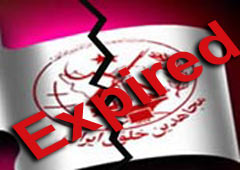The Egyptian government voiced its strong opposition to a planned meeting of the anti-Iran terrorist Mojahedin-e Khalq Organization (MKO) in Cairo and cancelled the convention. 
The meeting was scheduled to be held this afternoon in Pyramisa Hotel in Cairo, but the terrorist group canceled the meeting after the government of Egypt expressed its strong opposition and did not issue the necessary permission for the meeting.
The meeting organized by a number of MKO members in Iraq was aimed at demanding the UN and the international community to urge Baghdad to postpone the deadline for the expulsion of MKO members from Iraqi soil.
MKO’s members have two weeks to leave Iraq.
The MKO has been in Iraq’s Diyala province since the 1980s.
Iraqi security forces took control of the training base of the MKO at Camp Ashraf – about 60km (37 miles) North of Baghdad – in 2009 and detained dozens of the members of the terrorist group.
The Iraqi authority also changed the name of the military center from Camp Ashraf to the Camp of New Iraq.
Meantime, a report earlier this week disclosed that the main leader of the MKO, Massoud Rajavi, in remarks interpreted as informally declaring war on Iraq cautioned that he would not allow Baghdad to expel the group from Iraq, and stressed that he will keep the MKO in the country even if it costs the lives of all the group members.
According to a report published by the Habilian website, the official website of Iran’s Habilian Association – a human rights group formed by the families of 17,000 terror victims in Iran – on Tuesday, Rajavi has ordered the commanders of Camp Ashraf (the MKO’s main training center located in Iraq’s Northern Diyala province) to be ready to resist against the Iraqi forces, saying that it would not matter if all Camp residents are killed for obtaining his desired goals.
He also ordered his commanders to strengthen the military positions at the camp and in the surrounding areas by erecting numerous bulwarks and hurdles around the Camp and be ready for a war with the Iraqi government.
The MKO, whose main stronghold is in Iraq, is blacklisted by much of the international community, including the United States.
The MKO is behind a slew of assassinations and bombings inside Iran, a number of EU parliamentarians said in a recent letter in which they slammed a British court decision to remove the MKO from the British terror list. The EU officials also added that the group has no public support within Iran because of their role in helping Saddam Hussein in the Iraqi imposed war on Iran (1980-1988).
The group started assassination of the citizens and officials after the revolution in a bid to take control of the newly established Islamic Republic. It killed several of Iran’s new leaders in the early years after the revolution, including the then President, Mohammad Ali Rajayee, Prime Minister, Mohammad Javad Bahonar and the Judiciary Chief, Mohammad Hossein Beheshti who were killed in bomb attacks by MKO members in 1981.
The group fled to Iraq in 1986, where it was protected by Saddam Hussein and where it helped the Iraqi dictator suppress Shiite and Kurd uprisings in the country.
The terrorist group joined Saddam’s army during the Iraqi imposed war on Iran (1980-1988) and helped Saddam and killed thousands of Iranian civilians and soldiers during the US-backed Iraqi imposed war on Iran.
Since the 2003 US invasion of Iraq, the group, which now adheres to a pro-free-market philosophy, has been strongly backed by neo-conservatives in the United States, who also argue for the MKO to be taken off the US terror list.
Since the beginning of this year, the Baghdad government has repeatedly assured Iranian officials and people that it is determined to expel the MKO from Iraq by the end of 2011.
Last Sunday, Iraqi Ambassador to Tehran Mohammad Majid al-Sheikh underscored Baghdad’s serious decision for expelling the MKO from Iraq, and said the decision is irreversible.
"Based on the Iraqi government’s decision, the MKO members should leave our country by the end of 2011," al-Sheikh told FNA, and reiterated, "The decision is irreversible and definite."

